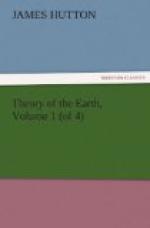We have now considered the globe of this earth as a machine, constructed upon chemical as well as mechanical principles, by which its different parts are all adapted, in form, in quality, and in quantity, to a certain end; an end attained with certainty or success; and an end from which we may perceive wisdom, in contemplating the means employed.
But is this world to be considered thus merely as a machine, to last no longer than its parts retain their present position, their proper forms and qualities? Or may it not be also considered as an organized body? such as has a constitution in which the necessary decay of the machine is naturally repaired, in the exertion of those productive powers by which it had been formed.
This is the view in which we are now to examine the globe; to see if there be, in the constitution of this world, a reproductive operation, by which a ruined constitution may be again repaired, and a duration or stability thus procured to the machine, considered as a world sustaining plants and animals.
If no such reproductive power, or reforming operation, after due inquiry, is to be found in the constitution of this world, we should have reason to conclude, that the system of this earth has either been intentionally made imperfect, or has not been the work of infinite power and wisdom.
Here is an important question, therefore, with regard to the constitution of this globe; a question which, perhaps, it is in the power of man’s sagacity to resolve; and a question which, if satisfactorily resolved, might add some lustre to science and the human intellect.
Animated with this great, this interesting view, let us strictly examine our principles, in order to avoid fallacy in our reasoning; and let us endeavour to support our attention, in developing a subject that is vast in its extent, as well as intricate in the relation of parts to be stated.
The globe of this earth is evidently made for man. He alone, of all the beings which have life upon this body, enjoys the whole and every part; he alone is capable of knowing the nature of this world, which he thus possesses in virtue of his proper right; and he alone can make the knowledge of this system a source of pleasure, and the means of happiness.
Man alone, of all the animated beings which enjoy the benefits of this earth, employs the knowledge which he there receives, in leading him to judge of the intention of things, as well as of the means by which they are brought about; and he alone is thus made to enjoy, in contemplation as well as sensual pleasure, all the good that may be observed in the constitution of this world; he, therefore, should be made the first subject of inquiry.




